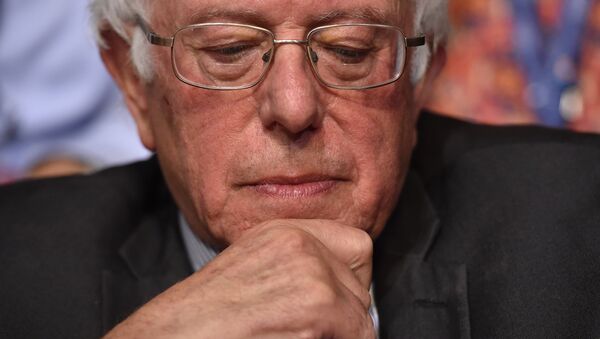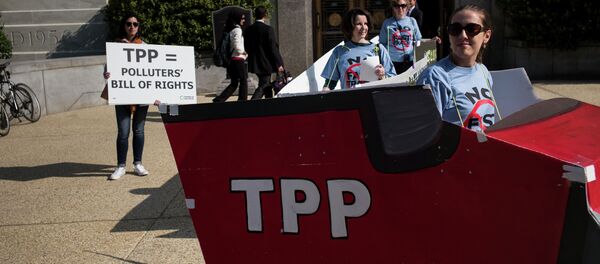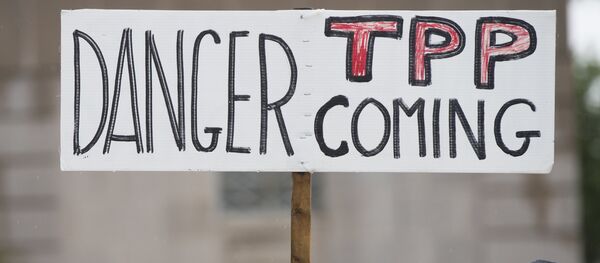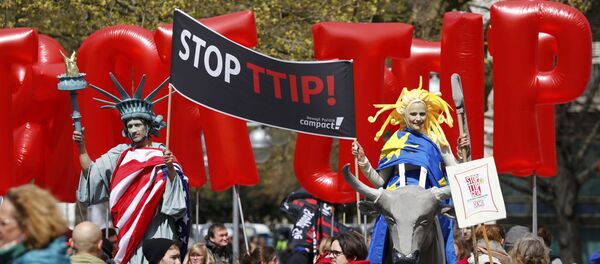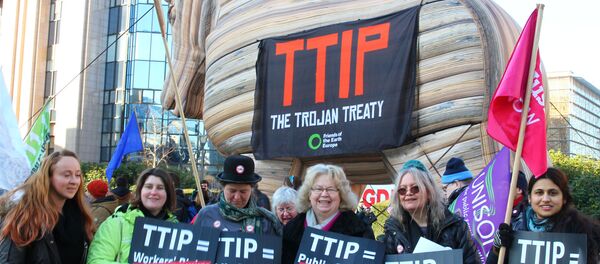Several high profile detractors have already indicated they will reject the deal, including Democratic nominee, Hillary Clinton, and Republican candidate, Donald Trump, both vying for the US Presidency this November.
Now, US Senator Bernie Sanders, an unsuccessful presidential candidate, but still extremely popular among grass-roots Democratic supporters, has called for the Democratic Party to officially abandon Obama's efforts to pass the TPP in Congress.
The TPP is a trade agreement among twelve Pacific Rim countries: the US, Japan, Canada, Australia, New Zealand, Malaysia, Vietnam, Singapore, Brunei, Mexico, Chile and Peru. Combined, their economies already account for 40% of world trade.
It's an attempt to liberalize global trade, with the signatories having pledged to either eliminate or reduce tariffs and restrictive policies from agricultural products and industrial goods. In all, nearly 18,000 tariffs could be affected.
Mr. President, what is this obsession you have with getting TPP passed under our noses? What is wrong with you?
— Matt Janovjac (@MJanovic) August 13, 2016
The finalized proposal was signed on 4 February 2016, in New Zealand, after seven years of talks. However, it still needs to be ratified, and that, increasingly, is looking like a distant prospect.
The TPP isn't 'free trade,' it's corruption https://t.co/NvuCWkZ31B
— Ian56 (@Ian56789) August 14, 2016
Stop #TPP #TTIP pic.twitter.com/RhgFs2bKLB
So Why Does It Matter?
President Obama has admitted it's an attempt by the US to exert control over global economics in the future, saying he wants Washington, rather than Beijing, to lay the foundations for "21st century trade rules."
"When more than 95% of our potential customers live outside our borders, we can't let countries like China write the rules of the global economy. We should write those rules," President Obama said.
To take effect, the deal must be ratified by February 2018, by at least six countries, which also account for 85% of the group's economic output. This means both US and Japan will need to be on board.
Heard Obama will be out in the Midwest touting TPP. Maybe he can use that "every family will save $2,500" line again. That was swell.
— Paul Nehlen (@pnehlen) August 17, 2016
With so much opposition in Congress, it's unclear whether there is enough support for this to happen in the next two years, let alone in the remaining six months of President Obama's presidency.
Even cautious TPP-backer and Speaker of the US House of Representatives, Paul Ryan, said this month in an interview with Wisconsin Public Radio, that he doubt's a deal could be struck in 2016.
"The sands are burning through the hourglass pretty fast, I don't see how they'll ever get the votes for it."
@Ricky_Vaughn99 Paul Ryan shedded policy he believed in just 2 get elected. Makes him just as dangerous and despicable as before dumping tpp
— Mike Gilmore (@MikeKGilmore) August 10, 2016
"I have my own problems with TPP. It is not ready, the president has to renegotiate some critical components of it," Mr. Ryan said.
So Bionically Crooked Hillary and Paul Ryan are *cough* against TPP. Anyone out there with a log-scale BS meter?
— Paul Nehlen (@pnehlen) August 17, 2016
If Obama fails to see the TPP ratified, it would be a hammer blow to US prestige, and may undermine another key US trade pact, this time with the EU: the Transatlantic Trade and Investment Partnership deal or TTIP.
The TTIP is still in much earlier stages of negotiations than the TPP.
However, the French have already indicated their considerable reluctance. In May, French President Francois Hollande even threatened to block the deal because France was opposed to unregulated free trade.
Then last month, France's Junior Minister for Trade and Commerce, Matthias Fekl, said in a blunt statement:
"I think a deal in 2016 is impossible and everyone knows it, including those who say otherwise."
EU Trade Commissioner Cecilia Malmstrom has admitted she is concerned with public perceptions surrounding the TTIP deal, but has insisted that all EU members are on board with the talks.
Some issues still to iron out, the #TTIP state of play https://t.co/koBhmnz8kk #USA pic.twitter.com/ea4tU70iFf
— EP Research Service (@EP_ThinkTank) August 11, 2016
French minister Mr. Fekl dismissed this reassurance.
"The Commission has made very surprising declarations these past weeks about these negotiations, which everyone knows are not going well or moving forward."
Fekl added that Malmstrom's confidence was "completely out of touch with what is happening in Europe where you have concerns over the way this kind of agreement is being negotiated, with promises of growth and jobs and very few results."
In Germany, tens of thousands have taken to the streets in protest against the trade pact, including during Obama's Germany visit last April.
In response, Washington has announced an EU-wide tour by US Secretary of State John Kerry, to attempt to bolster support for the beleaguered deal.
#TTIP-troubles in #Germany. Economics ministry specialists don't think deal can be reached by the end of this year https://t.co/Dpyfuxc7QP
— Saskia Gaster (@SaskiaG_MD) August 10, 2016
In a statement leading up to his arrival, Mr. Kerry said:
"I know there have been a number of comments […] from certain people in the region, suggesting that TTIP will not or cannot proceed forward. We frankly, gracefully I hope, and respectfully, disagree. Because we believe there has been some mythology that has been attached to it, and it is our job to adequately inform people about the facts of TTIP… actually work for the people of Europe."

